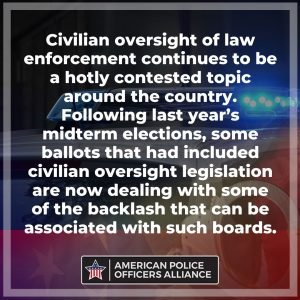Civilian oversight of law enforcement continues to be a hotly contested topic around the country. Following last year’s midterm elections, some ballots that had included civilian oversight legislation are now dealing with some of the backlash that can be associated with such boards. As the end of the first quarter of 2020 draws to a close, we see much uncertainty on the political landscape in the midst of the coronavirus pandemic. Nonetheless, it’s important to stay on task, safely, in spreading education regarding our country’s law enforcement and how to best support them.
Unfortunately, much of what civilian oversight boards do can be detrimental to a police force. By allowing civilians — or, realistically, any committee with potential bias — to oversee law enforcement actions, hiring decisions, and disciplinary measures, the situation becomes more volatile and prone to disaster. And so, it’s important that we keep close tabs on happenings surrounding police oversight boards so that we can be better informed on the best way to reduce these committees’ threat level while also protecting our police officers.
In Allegheny County, Pennsylvania this year, the city council is currently in the process of gathering feedback on the concept of police oversight boards. The feedback process consists of soliciting opinions of the public, law enforcement experts, police chiefs, municipal officials, and grassroots organizations. While this variety is useful, it nonetheless runs the risk of being too uneducated about police operations or too biased to provide a logical opinion. In August, Democrat-sponsored legislation to establish a law enforcement review board was voted down in a 9-6 vote. The legislation would have established an unpaid, nine member review board. Now that legislators are back to the drawing board, they’re turning to information gathering as they retool their bill for the next attempt.

Meanwhile, in New York City, where the Civilian Complaint Review Board is already in existence, the largest NYPD union in the state has sued its review board in protest of new measures that were passed in 2018. The legislation gave the CCRB even more control over the police department — a recipe for disaster — by tying the CCRB’s budget to the head count of the NYPD. The legislation also expanded the board from 13 to 15 members and would also compel the police commissioner to write out his reasoning when in disagreement with a disciplinary recommendation. All of this just seems to be a case of “too many cooks in the kitchen”, opening the door for corruption, coercion, and undue influence on the operations of police officers.
In Chicago, one of the hotbeds for civilian oversight board debate, committee meetings have seemed to come to a general consensus of support for the concept of police oversight boards. This consensus consists of ideas that civilians should have oversight and input over law enforcement and that their input should have a meaningful impact. Furthermore, the desire has been shown to enact as many as three member elected councils in each police district. This is an alarmingly extreme amount of oversight and civilian involvement in most, if not all, aspects of police operations and should be viewed with the utmost caution. Attending open meetings on the topic of public safety can help show support for police officers by educating others on the drawbacks of these oversight boards and councils.
Meanwhile on the West coast in Oakland, California, it’s become apparent that oversight boards that have been put in place show strong bias and propensity for corruption. In several instances outlined in this article, the Oakland Police Commission showed bias against the police it was purported to support. In addition to questionable outcomes of investigations, matters such as petty corruption for towing fees have also surfaced, adding to the murky waters.
Finally in our quarter one news roundup, the Police Commission in Portsmouth, New Hampshire is seeking to fill a vacancy left by newly-elected assistant mayor Jim Splaine. The Police Commission is unable to meet and perform its functions without all three member spots being in attendance, and two candidates have since stepped forward as the finalists for the position. The finalists, one a former police officer and one a former police commission member and current attorney, will be in line to fill this vacancy upon the Commission’s final decision.
As the conversations around oversight boards continue to swirl, we must stay abreast of news such as this. Analyzing these headlines and stories gives us insight into how the country is feeling about oversight boards and where attention must be directed to support law enforcement.








